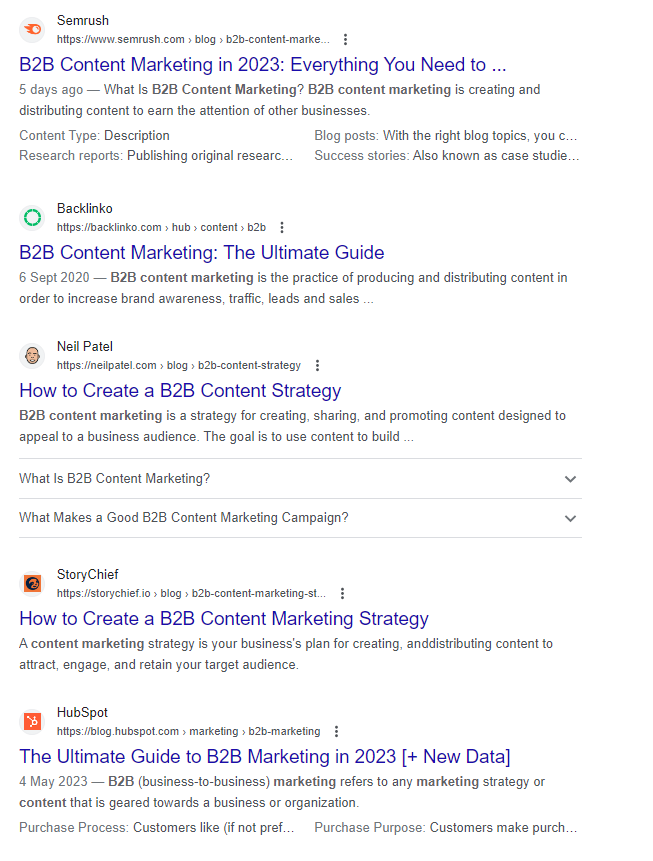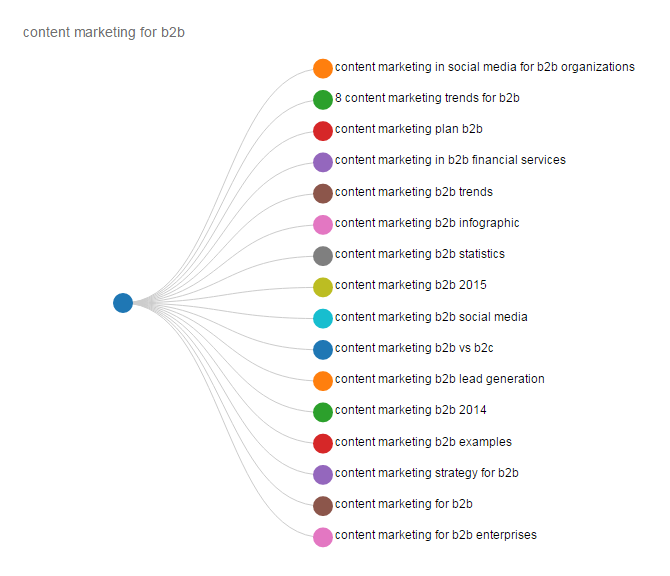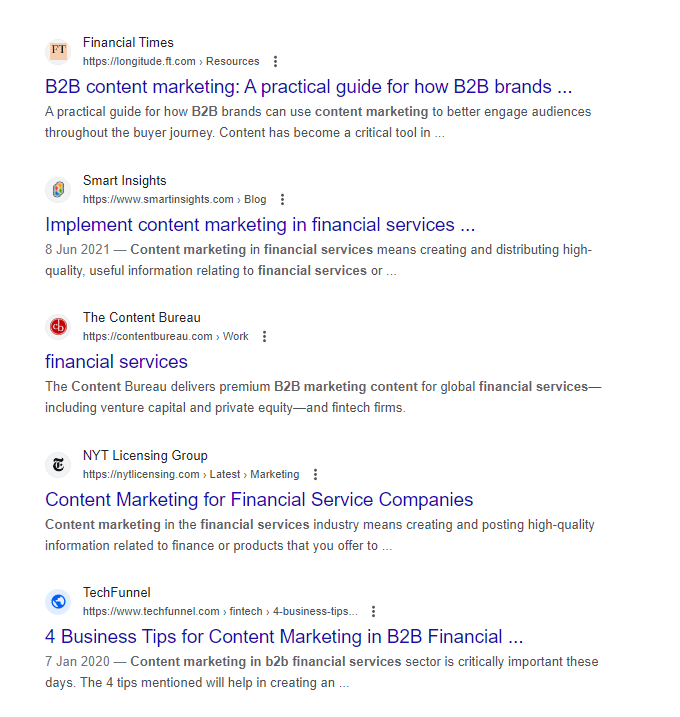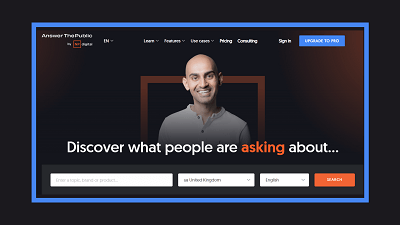Align Your Content With What People Are Searching For
Content marketing, in its purest form, is creating something which people will find interesting and adds value to the wider conversation. Content that is useful and engaging is likely to be shared and cited, attracting more traffic, which is why content marketers should dedicate plenty of time to producing high-quality output that will cut through the noise.
Effective content marketing hinges on creating useful, engaging material, but even the best article will go unread if it’s answering a question that no one is asking. Thus, before you start brainstorming topics and pitching titles, you need to know exactly what your target audience is looking for, and this is where Answer The Public comes in.
What does Answer The Public do?
Google’s autocomplete feature is a powerful tool for discovering what people are searching for; having built up a database from millions of searches, it’ll predict what you’re going to ask, based on the information that’s already been entered.
It doesn’t take much to reverse-engineer this and figure out what the most common searches are based on what Google suggests: “Content marketing in“ suggests a few useful ideas as the top predictions, implying that these are the most commonly searched topics.

Sidenote: We’re using “content marketing” as our article’s keyword because we want Google to know that when people search for content marketing services, they should be shown our website. To help you identify which keywords will work best for you, read through our guide to conducting keyword research).
You can also insert “wildcards” using _ and * symbols, prompting Google to fill in the blanks in your query:

The more variations we try, the more ideas we’ll have for content, and we can be confident that there is search volume behind every query because they’re all generated from questions which are actually being asked. Doing this manually is a long-winded approach, though, as you’re working through suggestions one by one.
Answer The Public is, essentially, an automated autocomplete tool; it follows the same process we’ve just outlined to identify potential topics for content, trying out different variations of your keywords. This allows you to complete your research far faster than you would manually, often with more detailed, sophisticated results. The results are then displayed, separated according to the variations used to create them: the “whys” are separated from the “hows”, and shown in a downloadable image (a great touch that makes these results easy to integrate into presentations).
Answer the Public’s keyword research tool also generates suggestions based on prepositions, such as “like”, “versus”, “with” and “without”, as well as an alphabetical search which adds letters to the original query, listing the most common queries which use each letter.
Top of the Topics
Answer the Public, sometimes referred to as Ask The Public, will give you plenty of potential topics, but you don’t need hundreds of ideas, just a few great ones. Separating the wheat from the chaff is the next step, by choosing the topics which will provide you with the most benefit. Not every question being asked will require you to create content answering it, so it is important to identify the searches that have value for your website, and are likely to engage with what you have to offer.
Step 1: Select a relevant topic
A big benefit of content marketing is the potential to build links to your site; once you’ve created a highly-trafficked piece of content you want to earn a few juicy backlinks to your website’s service and product pages. Therefore, you’ll want to pick a topic that can be easily connected to the pages you wish to promote. It’ll also need to be one to which you can provide an appropriate answer; people may be searching for “content marketing fundamentals with Dayna Rothman”, but they probably won’t be interested in an article we write for this topic (since they’re specifically looking for Dayna Rothman and she doesn’t work for us).
For example, we could take the topic “content marketing for b2b” from the above results, because this theme will link naturally to our own content marketing service pages. Not only will this improve organic traffic, but the “latent semantic indexing” (LSI) of the article will contribute to the SEO for our services page. To put that into English, Search Engines will make a connection between our service page and relevant keywords it finds in the article; “B2B marketing”, “digital marketing”, and so on, which will help us to rank higher for these valuable search terms.
Of course, you’ll also have to make sure you have somewhere to put this article; if you aren’t planning to publish this on your own website, it’ll need to be relevant to wherever you’re pitching it; it’s hard to imagine that a family blogger would publish our ‘content marketing for financial services’ article (or that we would generate much traffic from it if they did). That’s why when we begin a new client campaign we work to identify sites where we can place articles and over time we have built strong relationships with multiple publishers by providing them with highly topical content that answers the questions that their audience is asking.
If you need to find some publishers to work with, your first stop should be to read our guide to prospecting and influencer outreach, covering everything you need to know about finding the right sites for your audience.
You should also learn how to use the MozBar to conduct research into which sites are trusted authorities and which aren’t – if your article is hosted on a site with a poor reputation, your backlinks won’t hold much value.
Step 2: Can you compete?
So we’ve found a question which is being asked, but how well is it being answered? Well, let’s find out – feed the query into a Google search and let’s see what comes up:

It looks like there are plenty of people providing articles about content marketing for B2B, and several articles which have been produced in the last few months. In essence, this question is already being thoroughly answered, so if we want our content to be discovered, we’ll need to find a question that isn’t so competitive. Let’s go back to the answerthepublic.com app and try feeding “content marketing for b2b” in, to see what variations on this search we can find.

Step 3: The Need for Niche
This fresh query provides us with a new set of topics, which are more niche. Not too niche, though – remember, these all have an appreciable search volume, or they wouldn’t have been returned by ‘The Seeker’. Some of these, like the social media queries, are still hotly-contested, but the Google results page for “content marketing in B2B financial services” is far less crowded:

As you can see, there are a few results from authoritative sites that match the query, but some articles are quite a bit older as the query is less competitive. There’s plenty of space for us to write a fresh article that provides a better answer; “Our guide to effective B2B content marketing for financial services”, for example. Although Google will still happily display results that are several years old on the first page, searchers are likely to be drawn to more recent articles (especially in a fast-developing field like digital content marketing, where the game evolves very quickly). We could also add ‘2023’ to the title to make it relevant to the upcoming year and demonstrate its freshness to both Google and our prospective readers.
Results – what have we achieved?
What we’ve found is a gap in the market. Thanks to Answer The Public.com, we know that people are searching for “content marketing in b2b financial services”, and from following this topic up with a Google search we know that the results they’re being shown aren’t particularly brilliant. Now we can create an article that focuses on this topic, and because it’s relevant to our business, we can naturally link back to our own service pages, boosting our SEO whilst attracting organic traffic.
Get Help With Your Content Research
Researching your topics like this to develop your content marketing strategy is vital, as it lets you create content that is likely to be read, shared and referenced – all huge positives for your SEO. Answer The Public gives you insight into how people are searching for topical content and so helps you create better focused articles that catch the attention of your audience.
Don’t just be seduced by a snappy-sounding topic title; do your research, and you’ll reap the rewards that top quality content marketing has to offer.
For more support with your content marketing or if you have any questions about how to use Answer The Public for content ideas, feel free to get in touch.


